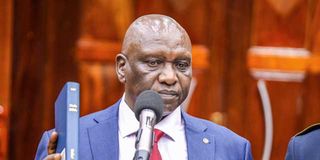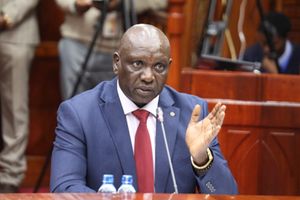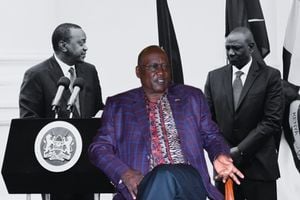
Nominee Inspector-General of the National Police Service Douglas Kanja Kirocho before the joint sittings of the National Assembly Committee on Administration & Internal Security and Senate Standing Committee on National Security, Defence & Foreign Relations at the County Hall Nairobi on Thursday, August 15, 2024.
It will be a full in-tray for Douglas Kirocho Kanja, President William Ruto’s nominee for the post of Inspector-General of Police, should he be approved by Parliament to take up the top job, which is currently under immense scrutiny over questions of excessive force used to deal with unarmed protesters, as well as a resurgence of abductions and extra-judicial killings.
Mr Kanja, 62, was this week vetted by Parliament and, if approved, will be seeking to succeed where his former boss Japhet Koome failed. Mr Koome resigned last month.
As the joint parliamentary committee on security that vetted him retreats to draft a report on his suitability, the Weekly Review looks into some of the areas that led to the premature exit of Mr Koome from the corner office at Jogoo House.
Former Inspector-General of Police David Kimaiyo, reflecting on the job and what would lie ahead for a holder of such an office, was categorical: “Sycophancy will not help.”
The biggest threat to a police IG, Mr Kimaiyo alludes, is the politicians and their attempt to influence the independent police’s work. “People around the President want to give you orders.
They (politicians) don’t see you as a professional police officer,” said Mr Kimaiyo during an extensive interview at his home in Kamendi, Trans Nzoia County.
Mr Kimaiyo, who faced the biggest test after terrorist attacks, the biggest one being Westgate in 2013, advises that the next IG should learn to exercise his independence as guaranteed by the Constitution.
Another challenge that Mr Kanja will have to learn how to navigate is striking the right chemistry with his boss, President William Ruto.
As the IG, Mr Kanja will be required to provide a day-to-day security brief to the Head of State. Unlike Mr Koome, who was said not to have the much needed chemistry with his boss, Mr Kanja is said to have struck the right cord when he served as the Deputy Inspector-General.
According to those familiar with behind-the-scenes happenings at State House, the President and Mr Kanja have enjoyed a good working relationship.
When the working relationship between former IG and the President failed last year, the President would speak to the DIG on important security matters. President Ruto would also occasionally get security briefs from Mr Kanja, according to sources.
Questions over Mr Koome’s place in the Ruto State House emerged in October last year when President Ruto held a key security meeting in the absence of the police boss.
The President received the taskforce report from Justice David Maraga team that had undertaken a study on what was ailing the National Police Service, Prisons and National Youth Service.
All top security chiefs, including the Interior CS Kithure Kindiki, DIG Noor Gabow and Mr Kanja had been invited to this event. Prison boss Brig (Rtd) John Kebaso Warioba was also present.
Even then the IG, who spoke to the Nation, insisted that everything was okay between him and his boss. Besides balancing the interests of the powerful individuals, Mr Kanja will be expected to continue with his core duties of providing leadership to the National Police Service.
Mr Kanja will be expected to develop measures and policies to deal with sticky issues such as the current pro-reforms protest by the youth.
The manner in which the former IG dealt with the demonstrations is said to be part of the reasons why he fell out with his bosses.
At the time, political leaders claimed that Mr Koome’s failure to speak during the crisis had led to a poor show of the government’s position on security matters.
At the height of the pro-reforms protests, the call for Mr Koome to resign had gained momentum, with some senators, including those in the majority, questioning his continued stay in office.
Kakamega Senator Bonny Khalwale said:“The President should quickly restructure the security organs by firing people, the IG included.” Kitui Senator Enoch Wambua also called on the President to sack Mr Koome.
“Talking about incompetence and lack of capacity, the Inspector-General of Police is the embodiment of lack of capacity to lead the Police Service. Mr Koome must leave office immediately for this country to enjoy peace and tranquillity.”
Nandi Senator Samson Cherargei had further called out Mr Koome for his silence since the start of the anti-tax demonstrations in the country. Mr Cherargei told senators that the IG had failed to update the country on a regular basis on the security situation at the time of the demonstrations.
On June 21, ODM leaders called on the IG to resign. How Mr Kanja deals with the other state agencies such as the independent Policing Oversight Authority and the National Police Service Commission is another issue that will determine how he will operate as the police chief.
The incessant fights between the IG’s office and the NPSC leadership will be an area of interest.
Last June, Prof Kindiki warned the former IG and National Police Service Commission chairman that they risk being fired over incessant fights.
At the time the Interior CS issued this warning, Mr Koome and NPSC chairman Eliud Kinuthia were engaged in a protracted fight over the hiring of civilian staff by the NPSC.
So serious was this fight that 51 civilians who were interviewed and hired by the NPSC were locked out of their offices.
The employees were reporting to their new workstations for the first time after their appointment. When they arrived at the Jogoo House offices, they were turned away by security officers who said they were acting on instructions from above.
Mr Kinuthia issued a press statement on the matter and accused the IG of issuing orders to police officers manning gates at Jogoo House not to allow the new staff to access their offices.
The fight between the two police bosses reportedly even found its way to State House. What followed was a series of mediation talks even as a section of the police chiefs impressed on the President to deal firmly with the fights.







